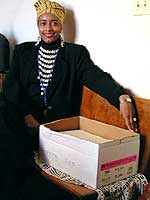By Art Hughes
Minnesota Public Radio
March 5, 2002
|
| RealAudio |
The destruction of files by a former Minneapolis city councilmember is making the transition difficult for her successor. Fifth Ward Councilmember Natalie Johnson Lee inherited an office virtually stripped of all paper and electronic files by her predecessor, Jackie Cherryhomes. More than any of the seven newcomers to the council this year, Johnson Lee is having to reconstruct the history of her ward's business for the previous 12 years.
| |
|
|
|
||
Natalie Johnson Lee stands in front of a wall of file cabinets in her office on the third floor of city hall. This is the place she would expect to find documents relating to the downtown Block E development, West Broadway, or the contentious Hollman Consent Decree. Instead, these cabinets are completely empty.
During one committee meeting, she called her situation a "mini-Enron," referring to the Texas energy giant's file-shredding binge surrounding the company's accounting scandals.
"Even though you can do your work, and you do your job - it is, to put it nicely, debilitating. It's more about institional history," says Johnson Lee.
As a political newcomer, Johnson Lee's narrow victory over Jackie Cherryhomes in the November election was a shock to most observers. Cherryhomes held the office for 12 years and, as council president, was often regarded as the most powerful person in city hall.
When she left office, she and her staff discarded all records of complaints or correspondence from residents of the ward. The missing information includes phone numbers, contacts and e-mails from the entire time Cherryhomes was in office.
Cherryhomes did leave a few files Johnson Lee describes as largely irrelevent. Johnson Lee says removing the files from the office was selfish and mean-spirited.
| |
|
|
|
||
"You had a lot of stuff. You had business associations that had projects going on, you had neighborhood associations that had projects going on, you had neighbors that had projects going on, you had individual people that had issues and things going on in the community. All that is gone," says Johnson Lee.
No outgoing councilmember purged their computer and paper files as completely as Cherryhomes. She acknowledges throwing away or deleting the office files. Cherryhomes defends her actions, saying she was well within her legal rights.
"The bulk of the files that were in my office were duplicative of records that are preserved elsewhere in the city system," Cherryhomes says. "Any reports of committee actions, reports from staff, are available through other city mechanisms and through the departments. So those files were not preserved."
Cherryhomes says she entered office 12 years ago without files from her predecessor, Van White. She says each councilmember has to build his own bank of relevant files. She says as a councilmember, you have to "own the job."
"It's a position that does not come with a rule book or a guidebook, or a description of how to go about doing it," she says. "Each councilmember does the job differently and has a different approach to it, and develops their own style in how to represent their constituents."
| |
|
|
|
||
Cherryhomes says she didn't keep a lot of records, relying on her own memory for many issues and contacts. She also says many documents were lost when an office computer crashed last fall.
She says she did delete all the records in what's known as the Constituent Tracking System. Cherryhomes says she was advised the computer files are not required keeping, since individual councilmembers use the system to a greater or lesser degree depending on their skills.
Council President Paul Ostrow says while many files don't technically need to be kept, it helps.
"Constituent tracking is one example. Constituents call with complaints and concerns and they develop histories, so you know what those concerns are," says Ostrow. "And just because a councilmember changes, those concerns don't change. So it's enormously helpful to have a record of those constituent concerns."
Ostrow says when he took office from Walt Dzeidzic four years ago, he had all the important records he needed.
City Hall guidelines require complaints from constituents be kept by the ward office for three years. General correspondence and what are known as subject files should be kept two years. Telephone logs should be held in the ward office for three years, according to city rules.
The Minnesota Data Practices Act says every record keeper must deliver all government records in their custody to their successor, when the office changes hands. What constitutes a government document is often open to interpretation. It's also difficult to prove whether some documents even existed.
Natalie Johnson Lee says regardless of the legal requirements, it's just good government to preserve the record.
"We now have to look at what type of institutional memory or history does the Fifth Ward even have. If the files were destroyed by councilperson Cherryhomes and were said to be destroyed by Councilmember Van White, that's almost a 20-year span of information in the fifth ward. So what does that mean? We have to be recreating information?" says Johnson Lee.
Technicians in City Hall are working to reconstruct documents deleted from Cherryhomes' office computer. Johnson Lee says she will work to solidify the city's policy to insure files are passed from one office to the next.


